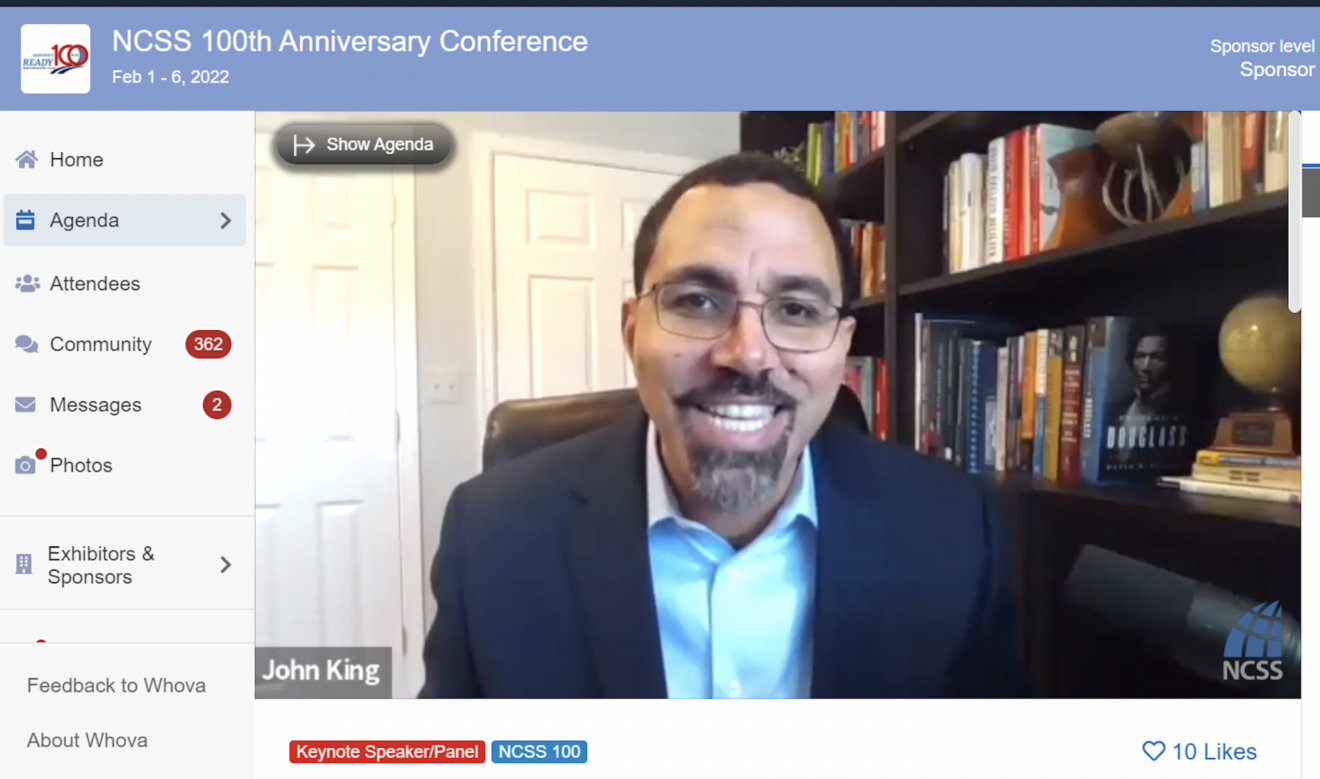Having courage and taking risks are nothing new for teachers but both are essential for social studies teachers in 2022, according to former US education secretaries Arne Duncan, John King Jr. and Rod Paige. The three leaders were the members of the keynote speaker panel on education policy at the recent 100th Anniversary Conference of the National Council for the Social Studies, with the theme of “Democracy Ready.”
While being asked to show courage in the face of numerous challenges, teachers have always been more courageous — and “pure of heart and more altruistic” — than people in other professions, said Duncan, who served from 2009 to 2016 under President Barack Obama. Duncan said teachers will need to “continue to work with courage and be willing to take some risks, which is again uncomfortable, difficult and, yes, unfair.”
While noting the creation by Gov. Glenn Youngkin in Virginia of a tip line to report teachers whose lessons about race and history may have made some students uncomfortable, King said offering a truthful account of history and preparing students for civic participation will involve some risks. The best defense against accusations of bias, he said, is to demonstrate proof that lessons meet standards and are backed up by primary sources.
“At the end of the day, I don’t think we can be afraid to share the truth in our classrooms,” said King, who succeeded Duncan to the end of Obama’s presidency.
Paige, who was education secretary from 2001 to 2005 under President George W. Bush, said history teachers should love the subject, and it should be mandatory for all students.
Political climate makes social studies fraught
Moderated by Jeffrey Rosen, president and CEO of the National Constitution Center, the videoconferenced panel covered the state of social studies teaching, the importance of civics education and other subjects as various states are considering or have enacted limits to what teachers can address in the classroom, such as racism, slavery and other topics.
Paige said students need to understand the past to understand the present: “History is a dynamic subject. And you need to understand history to understand the moment that you are in now. The moment you’re in now is the result of what happened before, which is the result of what happened before, which is the result of what happened before.”
In response to a question about suggestions for social studies teachers, Duncan said teachers should shift from rote memorization of facts toward more storytelling, debates and connecting students with peers around the country and the world. Duncan agreed with Paige that learning history is necessary, adding that the only way to grow is to stretch and noting that stretching can sometimes be uncomfortable.
“We have to understand our history – the good, the bad and ugly,” Duncan said. “We have to learn from it. It’s nothing personal. It is not an indictment of anybody.”
Critical thinking can involve discomfort
King also described discomfort as evidence of learning.
“Well, the truth is, learning sometimes has to be uncomfortable so that you are thinking and doing the work to analyze where we’ve been and how we move forward,” said King. He urged social studies teachers to use primary sources, such as newspaper articles that show the thinking at the time in history. He also encouraged working with English teachers on interdisciplinary opportunities for students.
At the beginning of the panel, each leader shared personal stories of teachers who changed their lives. The 88-year-old Paige, the first Black person to serve as US education secretary, recalled his childhood in Mississippi and the experience of having his first white teacher while he was in graduate school in Indiana. Duncan mentioned that his parents were teachers and recalled a high-school English teacher who encouraged students to speak their truth.
King said his seventh-grade social studies teacher inspired him to pursue the same career. Describing his home life as “incredibly difficult,” King said his mother died when he was 8, while his father, whom he described as sad, angry, sometimes silent and sometimes violent, suffered from Alzheimer’s disease and died when King was 12.
“The thing that saved me was school,” said King, who attended public schools in New York City. “[School] was the one place that was safe and consistent and nurturing. And I really was blessed to have a series of phenomenal teachers who gave me a sense of hope and purpose.”
Media literacy a vital part of social studies
On the topic of misinformation and disinformation on the internet and social media, Paige said the nation is challenged to decide what the nation’s “official” view is about what students should learn in school. Making determinations about what’s right and what’s wrong is difficult, but “that’s part of our freedom, and that’s what makes our nation great,” he said.
Looking ahead, Duncan said threats to democracy in recent years have “shaken me to my core.” While saying it would be unfair to put the fate of the nation on the shoulders of social studies teachers alone, Duncan said democracy cannot survive by itself.
“Absent hard work, courage [and] education, [democracy] could easily disappear,” Duncan said, noting the hundreds of years it took to build democracy in the US and how fast it has become threatened by “those who are not pro-democracy.”
“That’s the conversation we should be having in classrooms around the country,” Duncan said.
Trigie Ealey is an editor for SmartBrief Education.
________________________________
If you liked this article, sign up for SmartBrief’s free email newsletter from ASCD. It’s among SmartBrief’s more than 250 industry-focused newsletters.
More from SmartBrief Education:
- 5 ways to improve your virtual teaching
- Changing the classroom experience with instructional audio
- Powerful social media solutions for students
- How comics curriculum boosts SEL
- 8 ways to make vocabulary instruction more effective
